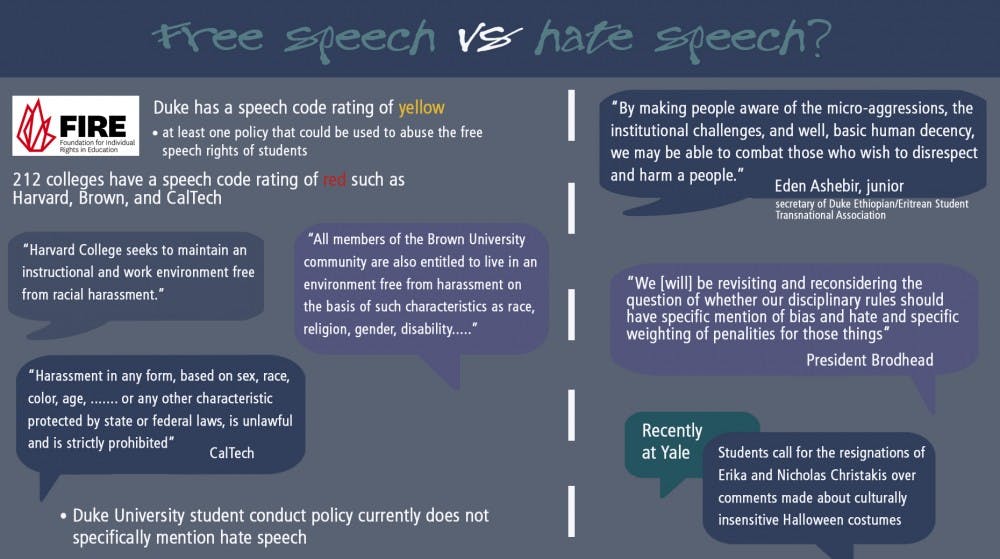After recent events involving hate speech both on campus and nationally, administrators and students are debating how to balance freedom of speech with an inclusive, safe campus climate.
Although a hate crime is punishable by law because it perpetrates violence or harm, hate speech is more difficult to eliminate because it is often protected by the First Amendment. Long-standing traditions of free speech on campus have also established a precedent of protecting extreme and even hateful speech. After the defacement of the Black Lives Matter poster with a racial slur along with other racially charged incidents, students have protested and called for administrative action to create policies against hate speech on campus. According to Duke Student Affairs' website, University student conduct policy currently does not specifically mention racial harassment or hate speech.
"We [will] be revisiting and reconsidering the question of whether our disciplinary rules should have specific mention of bias and hate and specific weighting of penalties for those things," President Richard Brodhead said during an interview Friday.
Brodhead added, however, that introducing policies against bias and hate speech runs the risk of inhibiting free expression on campus. As a result, designing such policies can be complicated, and few universities have managed to do so successfully.
"If the great majority of universities in America don’t have that kind of regulation, it isn’t because they don’t care about these things," he explained. "It’s because there are complications in administering that have to be worked through."
Free speech advocacy organizations in particular have taken a number of universities across the country to task for adopting regulations on student conduct that may limit certain types of speech. Robert Shibley, executive director of the Foundation for Individual Rights in Education and Trinity ‘00, wrote in an email that his organization would oppose any attempt by Duke to limit expression in the wake of hateful incidents on campus.
“Free speech is the bulwark of minority rights and acceptance. If Duke compromises free speech, it will compromise both of these things,” he wrote. “Having attended Duke myself, I can think of no reason this would be untrue on Duke’s campus when it has been true so many times throughout history.”
FIRE—which rates colleges based on their free speech policies—gives Duke a speech code rating of “yellow,” meaning that there is at least one policy that could be used to abuse the free speech rights of students. According to FIRE, Duke’s Bias Response Advisory Committee threatens the freedom of speech of students.
The Bias Response Advisory Committee is tasked with advising “the Vice President for Student Affairs on allegations of bias-related incidents that may impact the Duke community,” according to the committee's website. A bias-related incident is defined as when a person’s bias against an aspect of another’s identity motivates a particular action.
Lisa Beth Bergene, associate dean for East Campus and co-chair of the committee, said that the committee—which will be augmented or replaced by a new task force announced by Brodhead during an open forum Friday—has not been asked to convene at this time regarding the defacement of the Black Lives Matter poster or any other hate speech issue.
In response to this incident, Shibley noted that a punishment for the perpetrator is warranted but not because of the writer’s intentions.
“Defacement of posters or other publications around campus is vandalism, and is punishable by law,” Shibley wrote in an email. “If you disagree with a particular poster or publication’s message, the right course is to respond with your own expression, not tear down, trash or vandalize the expression you dislike,”
Student suggestions for handling hate speech have ranged from advocating for more open conversations to direct administrative action.
“Hate speech can, in my opinion, only be combated with education. Those who so freely spew out their ignorance have chosen to live in their privilege and deny the struggles of the rest because it is just that easy to do when it isn’t your lived experience,” said junior Eden Ashebir, secretary of Duke Ethiopian/Eritrean Student Transnational Association. “By making people aware of the micro-aggressions, the institutional challenges, and, well, basic human decency, we may be able to combat those who wish to disrespect and harm a people.”
During Friday’s forum, Brodhead said other institutions’ policies regarding hate speech would be taken into account moving forward. Free speech issues at a number of other universities across the campus have recently risen to prominence
At Yale University, Erika Christakis, associate master of Silliman College, questioned the value of an email from Yale administrators asking students to refrain from wearing culturally insensitive Halloween costumes. Students subsequently protested and called for the resignation of Christakis and her husband Nicholas Christakis, the master of Silliman College.
According to the Yale Daily News, Yale President Peter Salovey reaffirmed support for Nicholas and Erika Christakis and announced policy reforms in response to student demands in an email to Yale students Wednesday.
In FIRE’s database, there are 212 colleges that have a speech code rating of “red,” which means that “the university has at least one policy that both clearly and substantially restricts freedom of speech.” Among these schools are Harvard University, Cornell University, Princeton University, Brown University, Columbia University and California Institute of Technology. All of these schools explicitly define bias, hate speech or racial harassment in their student conduct policies.
FIRE argues that Harvard's policy stated in its Handbook for Students defining racially derogatory speech directed towards others as racial harassment limits free expression. It also deems Columbia's policy of forbidding campus email users from sending "obscene, harassing, offensive or other unwelcome messages" as a restriction on free speech.
Get The Chronicle straight to your inbox
Signup for our weekly newsletter. Cancel at any time.
Class of 2019
Editor-in-chief 2017-18,
Local and national news department head 2016-17
Born in Hyderabad, India, Likhitha Butchireddygari moved to Baltimore at a young age. She is pursuing a Program II major entitled "Digital Democracy and Data" about the future of the American democracy.

